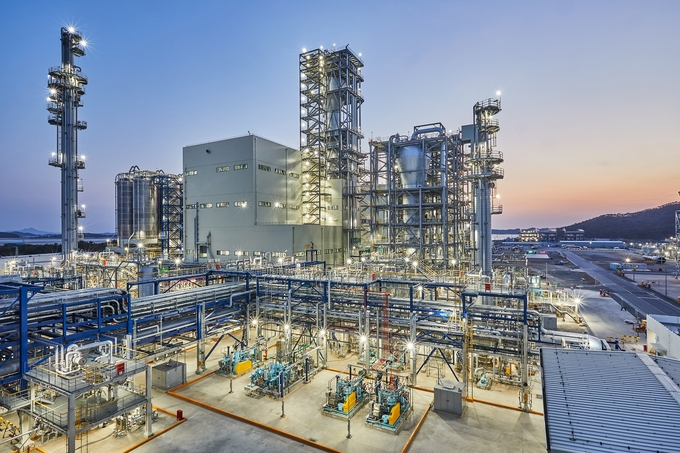Petrochemicals
Hanwha Total becomes S.KoreaŌĆÖs largest polypropylene maker
By May 06, 2021 (Gmt+09:00)
1
Min read
Most Read
Samsung shifts to emergency mode with 6-day work week for executives


Alibaba eyes 1st investment in Korean e-commerce platform


Blackstone signs over $1 bn deal with MBK for 1st exit in Korea


NPS loses $1.2 bn in local stocks in Q1 on weak battery shares


OCI to invest up to $1.5 bn in MalaysiaŌĆÖs polysilicon plant



Hanwha Total Petrochemical Co., a 50:50 joint venture between Hanwha Group and the French oil giant Total SE, has become the company with the largest polypropylene (PP) production capacity in South Korea.
The company on May 5 said that it has completed the extension of its PP and ethylene manufacturing facilities in Daesan, South Chungcheong Province, after having invested a total of 530 billion won ($470 million) in the 28-month construction project.
The PP and ethylene facilities extension will generate additional revenue of 840 billion won ($746 million) annually, according to the companyŌĆÖs estimates.
The extension adds 400,000 tons to Hanwha TotalŌĆÖs previous annual PP production capacity of 720,000 tons, making it the largest PP manufacturer in the country with the ability to supply 1.12 million tons annually.
PP is a synthetic plastic material widely used by consumers, in disposable food packaging, food containers and other household products, as well as by industries, in auto vehicles and electronic components.
The material is projected to see higher demand this year, given increasing use of disposable food packaging amid the ongoing pandemic.
The construction project has also increased the companyŌĆÖs annual production capacity for ethylene from the previous 1.38 million to 1.53 million tons.
The company noted that the new facility uses liquefied petroleum gas (LPG) instead of naphtha, a more costly petrochemical material commonly used for ethylene production, to produce ethylene, thereby maximizing cost efficiency.
A Hanwha Total representative said the completion also marks an end to its long-term product diversification project, for which the company had invested a total of 1.47 trillion won ($1.3 billion) since 2017, to move away from basic petrochemicals toward synthetic chemicals of higher value.
ŌĆ£Hanwha Total, with the successful completion of the facilities expansion, will continue to maximize production efficiency and enter new business segments for future growth,ŌĆØ said the representative.
Write to Kyung-min Kang at kkm1026@hankyung.com
Daniel Cho edited this article.
More to Read
-
 EarningsKumho Petrochem posts strong Q1, chairman resigns to end family feud
EarningsKumho Petrochem posts strong Q1, chairman resigns to end family feudMay 04, 2021 (Gmt+09:00)
3 Min read -
 EarningsHyosung units post record Q1 earnings, justifying high valuation
EarningsHyosung units post record Q1 earnings, justifying high valuationMay 03, 2021 (Gmt+09:00)
3 Min read -
 Specialty chemicalsS.Korean chem firms look to specialty chemicals to drive growth
Specialty chemicalsS.Korean chem firms look to specialty chemicals to drive growthJan 17, 2021 (Gmt+09:00)
4 Min read -
 Petrochemical oversupplyGlobal petrochem supply glut divides KoreaŌĆÖs winners, losers
Petrochemical oversupplyGlobal petrochem supply glut divides KoreaŌĆÖs winners, losersNov 09, 2020 (Gmt+09:00)
3 Min read
Comment 0
LOG IN


